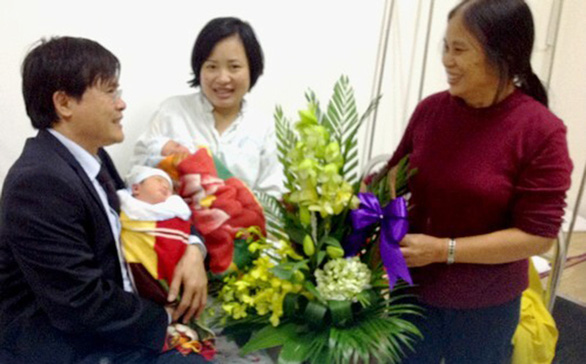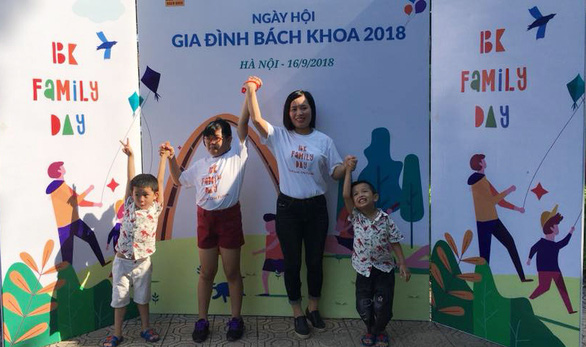Dung, from Hoang Mai District in Hanoi, had her life turned upside down 10 years ago when her beloved husband, Ho Sy Ngoc, died in a traffic accident at the age of 27.
Despite dealing a devastating blow to his wife, Ngoc’s passing did not put an end to their love story but brought about a miracle.
Though the couple already have one daughter, his young widow, only 27 herself, decided to bear at least one more child.
The miracle worked thanks to in vitro fertilization (IVF) using sperm extracted from Ngoc and frozen for three years after his passing, the first case ever in Vietnam.
Testimony of love
According to Dung, she and her husband had been in love since 2002 before getting married.
The newly-weds, however, did not have much time together as only six months later Dung went to study in France, where she worked on her PhD degree for five years.
Not long after coming back, she gave birth to their first baby girl in September 2009.
When her husband got killed in the tragic train collision, their daughter, Ho Hoang Hai Binh, was only six months old.
“It was just surreal, I got numb and overwhelmed,” Dung emotionally recalled the moment she was taken to the morgue to see her husband for the last time.
Until now, his face has never faded from her mind.
“It was as if he were sleeping peacefully, except that his lower part was soaked with his own blood,” she recounted.
“A waft of warmth suddenly seemed to engulf me.
“It was at that moment that I made a promise to bear him one more child.”
To such an accomplished member of the local academia like Dung, the idea was not new.
The associate professor said during her time studying in France, she had read about how sperm from a man found dead buried in snow survived and the possibility of keeping the sperm of deceased people in frozen storage.
Dung consulted the hospital where Ngoc was rushed to following the accident and got a ‘No’ over lack of technology know-how.
She then turned to her friends and a Vietnamese professor working in France, who knew a doctor at a Hanoi-based hospital capable of performing the advanced procedure.
|
|
| Dr. Le Luong Van Ve and his wife visit Hoang Thi Kim Dung (center) after she gave birth to her twin boys from her dead husband’s frozen sperm in 2013. Dr. Ve, who successfully performed the miracle procedure, and his wife also act as the newborns’ godparents. Photo: Tuoi Tre |
Though several women in other countries made history by using their dead husband’s sperm to try to conceive a child, for Vietnam, this was the first time that the procedure had been successful.
According to an expert on genetics, this is really an achievement for the local medical sector.
Sperm freezing was in its infancy in Vietnam back then and there were no precedents whatsoever for preserving those extracted from cadavers.
In reality, the possibility of retrieving live sperm from a clinically dead person is not high, with the reproductive cells unlikely to survive for more than six hours, so early intervention for a high rate of sperm viability is required, Dung noted.
It was a race against the clock as she asked her close friend to track down the doctor whom her instructor referred to.
In a rush to help, the friend’s motorbike broke down after they hit a pile of rubble on the road.
By sheer chance, they spotted an advertisement for an andrology and infertility clinic.
With no phone number provided, the friend turned to 1080, a trusted information provider by phone back then.
All the efforts bore fruit when the friend finally talked on the phone to Dr. Le Luong Van Ve, then director of the Hanoi Andrology and Infertility Hospital.
Dr. Ve, who had done extensive research on the issue for 19 years, was positive he could perform the unprecedented procedure successfully.
According to Truong Thuy Ngoan, Dr. Ve’s wife, her husband passed away some time ago.
“He was very excited about the case, though he kept a low profile of what he was doing,” Ngoan recalled.
“He showed great enthusiasm each time he checked on the sperm activity and I knew he was doing well.”
At the very first meeting with the pundit, Dung had strong faith that he could make it.
“I heaved a sigh of relief learning that the sperm were alive,” she said.
Acting on Dr. Ve’s advice, Dung waited for another three more years to take better care of her first child while shrugging off social stigma against her pregnancy following her husband’s death.
Vietnamese people customarily spend three years in mourning for parents and spouses after their death.
In 2013, she persuaded her own parents and in-laws of her decision to conceive another child for her late husband.
“My father-in-law was concerned if it would be too much for me to take care of the children myself,” Dung shared.
“But I was willing to go for it.”
Despite Dr. Ve and his team’s preparedness, there was a minor incident.
As Dung underwent ovulation induction — the stimulation of ovulation by medication — the embryo needed to be frozen.
With that over, after undergoing IVF, Dung had her health and her pregnancy tracked at the Hanoi Andrology and Infertility Hospital in the first three months, then at the Central Obstetrics Hospital, where she gave birth to the twin boys.
“Medically speaking, this is an unprecedented case in Vietnam and other Southeast Asian countries. Such cases are also rare in the world,” Dr. Ve once noted.
“Though sperm freezing has been adopted earlier, it can prove that sperm can outlive the cadavers.”
The doctor put his success down to high-precision procedures, luck, Dung’s strong will, and her own family and in-laws’ support.
The twins underwent DNA paternity testing to prove their biological relatedness to their deceased father and paternal grandparents.
Happy foursome
|
|
| Hoang Thi Kim Dung and her three children are seen at an event held at the Hanoi University of Science and Technology, Vietnam in this supplied photo. |
A woman of iron will who could turn adversity into opportunity, Dung is content with her life.
The twin boys, Ho Sy Hoang Duc and Ho Sy Hoang Hai, aged seven, strongly resemble their father’s appearance and personality.
Dung currently lectures and does research in aeronautics at the Hanoi University of Science and Technology.
Sweet memories of Ngoc, her late husband, who was her high school sweetheart, live on in her heart.
Both outstanding students at the Hanoi University of Science and Technology, they tied the knot upon graduation before she went to France for five years for her PhD degree.
The eldest son in his family, Ngoc gave up the opportunity to pursue PhD education in France in favor of his wife and took care of his own and Dung’s families while she was away.
Grateful for his love and sacrifice, Dung found bearing him more children a great source of solace.
Her children are brought up to believe their father is still alive in another form, always watching over them and teaching them the right from wrong.
There are two things that Dung now dedicates herself to: her three kids and scientific career.
“People keep asking why I haven’t remarried. Earlier I said ‘no’ and now I still put the idea aside,” Dung shared.
“I will not consider remarrying until my children grow a little older and my career thrives a bit more.”
Like us on Facebook or follow us on Twitter to get the latest news about Vietnam!






